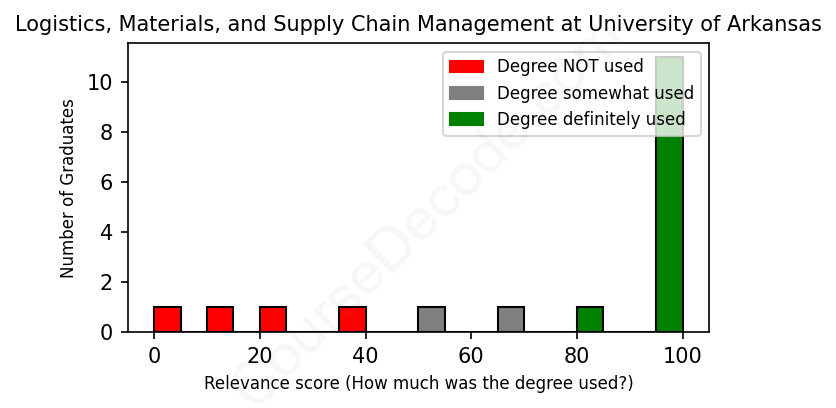
First, some facts. Of the Logistics, Materials, and Supply Chain Management graduates from University of Arkansas we've analyzed , here's how many have used (or NOT used) their degree in their career:

These are estimates based on AI analysis of 18 LinkedIn profiles (see below).
The verdict? Above average. Overall, with an average relevance score of 76%, Logistics, Materials, and Supply Chain Management graduates from University of Arkansas have a higher likelihood (+9%) of finding work in this field compared to the average graduate across all fields:
And for comparison, here's the chart for all profiles we've looked at across all degrees.
Also, after graduating, only 11% of these graduates have pursued further education other than another Bachelor's degree (such as a Masters degree or other), compared to the average across all profiles of 35%. This suggests a Bachelors degree is enough for most Logistics, Materials, and Supply Chain Management graduates, and it's normal to look for work straight after graduation.
See the details:
|
Relevance score: 100% We think this person has gone into a career highly relevant to their degree. We think this person has gone into a career highly relevant to their degree.
DEGREE INFOGraduated in 2023 from University of Arkansas with a Bachelor's degree in Logistics, Materials, and Supply Chain Management. No other secondary education since. JOB HISTORY SINCE GRADUATIONSenior Analyst, Merchandising Walmart Mar 2024 - Present ABOUTNo information provided. |
The top 10 most common jobs done by the graduates we've analyzed (ranked most common to least) are:
After digging through the job paths of graduates from the University of Arkansas with degrees in Logistics, Materials, and Supply Chain Management, it’s clear that many of them have landed in roles closely tied to their field of study. You’ll find a bunch of positions like Operations Managers, Supply Chain Analysts, and Logistics Coordinators popping up frequently. These jobs really tap into the skills and knowledge the grads gained during their studies, such as managing logistical operations, optimizing supply chains, and implementing strategic planning. For instance, roles at major companies like Walmart and J.B. Hunt Transport Services highlight how they apply logistics know-how on a day-to-day basis.
However, the picture isn’t all roses; some grads have ventured into jobs that aren’t directly relevant to logistics or supply chain management at all. Jobs in education, financial analysis, and compliance seem to stray pretty far from the core competencies of their degree. While these roles may sometimes require transferable skills, they don’t leverage the specific training that students received. Overall, it looks like the majority of the graduates are doing quite well in their field, but there’s a noticeable chunk that took paths away from what they trained for. In the end, it’s all about finding the right fit between passion and profession.
Here is a visual representation of the most common words in job titles for Logistics, Materials, and Supply Chain Management graduates (this is across all Logistics, Materials, and Supply Chain Management graduates we've analyzed, not just those who went to University of Arkansas):

Looking at the career paths of graduates from the University of Arkansas who studied Logistics, Materials, and Supply Chain Management, it’s clear that many have moved into relevant roles right after graduation. Typically, their first jobs involve hands-on positions in logistics or supply chain management, such as shipping specialists, operations supervisors, or analyst roles. For instance, several graduates landed roles at major companies like Walmart and Lockheed Martin, showing that their degrees opened doors to entry-level positions in well-established organizations.
Fast forward five to ten years, and it seems like many graduates have found their footing and advanced their careers significantly. Many have moved into management positions or specialized roles, such as supply chain planners, procurement analysts, or even higher management roles like Transportation Manager or Senior Analysts in logistical strategies. While some individuals took detours into roles that might not directly relate to their degree—like teaching or compliance—the trend shows that a solid number have indeed built successful careers in logistics and supply chain management. Overall, it appears that this degree offers good pathways into meaningful jobs, with many graduates climbing the corporate ladder over the years.
Pursuing a Bachelor’s degree in Logistics, Materials, and Supply Chain Management can be pretty manageable, but it definitely has its challenges. At the University of Arkansas, you might find that it's on the easier side compared to some other business degrees, mainly because the coursework is designed to be pretty practical and hands-on. You’ll likely tackle topics like inventory management, transportation systems, and operations strategy, which can be interesting and relatable if you like problem-solving and real-world applications. While it's not a walk in the park—especially if you're not into math or analytical skills—many students find the material engaging and enjoyable. Just make sure you stay on top of your assignments and collaborate with your peers; that teamwork aspect can really help lighten the load!
Most commonly, in the LinkedIn profiles we've looked at, it takes people 4 years to finish a Bachelor degree in Logistics, Materials, and Supply Chain Management.
Looking at the career paths of these Logistics, Materials, and Supply Chain Management grads from the University of Arkansas, it seems like a pretty mixed bag when it comes to making decent money. The older grads, especially those working at established companies like Verizon and Walmart, likely snagged some solid paychecks as they climbed the ranks, moving into higher-level positions over the years. Meanwhile, some of the more recent grads are still in early-career roles or internships that probably don’t pay as much right off the bat, though they’re on the right track with companies like J.B. Hunt and Lockheed Martin, which are known for solid salaries. Overall, it looks like if they stick with it, especially in companies typical for this field, a lot of them have the potential to earn good money down the line!
Here is a visual representation of the most common words seen in the "about" section of LinkedIn profiles who have a Bachelor degree in Logistics, Materials, and Supply Chain Management (this is across all Logistics, Materials, and Supply Chain Management graduates we've analyzed, not just those who went to University of Arkansas). This may or may not be useful:

Here are all colleges offering a Bachelor degree in Logistics, Materials, and Supply Chain Management (ordered by the average relevance score of their Logistics, Materials, and Supply Chain Management graduates, best to worst) where we have analyzed at least 10 of their graduates:
| College | Score | Count |
|---|---|---|
 Michigan State University Michigan State University
|
84 | 23 |
 Auburn University Auburn University
|
83 | 19 |
 Ashford University Ashford University
|
82 | 12 |
 University of Wisconsin-Milwaukee University of Wisconsin-Milwaukee
|
81 | 10 |
 Rutgers Business School Rutgers Business School
|
79 | 24 |
 Penn State University Penn State University
|
78 | 21 |
 Embry-Riddle Aeronautical University Embry-Riddle Aeronautical University
|
78 | 10 |
 Arizona State University - W. P. Carey School of Business Arizona State University - W. P. Carey School of Business
|
78 | 14 |
 Iowa State University Iowa State University
|
77 | 14 |
 University of Houston University of Houston
|
76 | 30 |
 University of Arkansas University of Arkansas
|
76 | 18 |
 University of Tennessee, Knoxville University of Tennessee, Knoxville
|
75 | 15 |
 University of North Texas University of North Texas
|
69 | 14 |
 Texas A&M University Texas A&M University
|
67 | 27 |
 Georgia Southern University Georgia Southern University
|
62 | 13 |
 The Ohio State University The Ohio State University
|
60 | 10 |
 University of Houston-Downtown University of Houston-Downtown
|
57 | 13 |